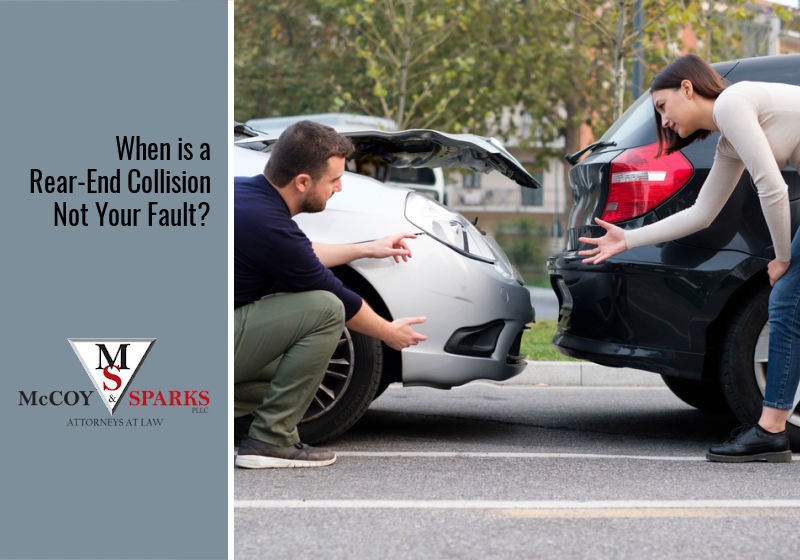
Rear-end collisions are among the top three most common kinds of car accidents in the United States. And not only are these types of collisions common, but when they do occur, they can result in significant damage and injuries.
When you are injured in an accident due to someone else’s negligence, you can file a claim against the guilty party and their insurance company for compensation. However, one of the biggest issues with rear-end collision claims is determining who was at fault and thus eligible for compensation.
At McCoy & Sparks, our Kentucky car accident attorneys have years of experience handling a variety of cases, including those involving rear-end collisions. If you need help with your claim and recovering compensation, we are here to help.
What is a Rear-End Collision?
Rear-end collisions are a type of car accident that occurs when one vehicle runs into the back of another. These kinds of accidents are incredibly common and can happen almost anywhere, including parking lots, highways, stop signs and traffic signals, and anywhere else on the road.
What Causes Most Rear-End Collisions?
One of the most common causes of rear-end collisions is distracted driving, such as talking, eating, grooming, or using a phone while driving. Rear-end accidents are also very common when there is traffic congestion on the roads or highways.
As a whole, rear-end collisions can occur for many reasons, including:
- Tailgating
- Using a cell phone while driving
- Road rage
- Speeding
- Brake checking
- Bad weather and slippery roads
- Fatigued driving
- Driving while intoxicated
- Reversing without looking
- Sudden stopping
Can a Car Be Totaled From a Rear-End Collision?
Technically, while rear-end collisions are common, they are not considered the most dangerous type of collision. This is because the rear of a car, including the bumper, is specifically designed to withstand powerful impacts.
However, that being said, rear-end collisions can and do lead to significant damage and even catastrophic injuries. This is particularly true when the impact occurs at high speeds or when the vehicle that was hit from behind is much smaller than the other vehicle. For example, if a semi-truck rear-ends a smaller passenger vehicle, the results can be devastating.
As such, it is very possible for a car to be totaled from a rear-end collision. It might not happen often, but it is possible.
Who’s At Fault in a Rear-End Collision?
Kentucky law essentially says that, in most rear-end collision cases, the fault lies with the driver in the rear. In other words, the person that ran into the car in front of them is the one at fault. This is because drivers have a duty to control their vehicles, which includes maintaining a safe distance from the cars in front of them.
For example, even if you rear-ended someone because your car slid on ice or because the person in front of you slammed on their brakes, you will likely still be the one at fault because you did not leave enough room between your car and theirs to allow for you to stop in time without hitting them.
When is a Rear-End Collision Not Your Fault?
There are some exceptions to this rule. Though the driver that did the rear-ending is almost always at fault, there are some circumstances in which the driver in front could be at fault.
The driver in the lead car could be at fault if:
- Their brake lights or turn signals are broken
- They reverse suddenly, causing the car behind to rear-end them
- They are driving recklessly
- They have an emergency but fail to pull over out of the way of oncoming traffic
What is the Average Payout for a Rear-End Collision?
The compensation you can recover for a rear-end collision can vary depending on the damages you have suffered as a result of the accident. Each accident is unique, and therefore there is no way to know upfront how much money you will be awarded.
Such damages that play a role in how much the payout for your rear-end collision will be can include:
- Medical bills
- Future medical expenses
- Lost wages
- Reduced earning capacity
- Physical pain and suffering
- Emotional distress
- Permanent impairment
- Loss of consortium
- Reduced quality of life
- Property damage
When you file your claim, working with an attorney can help you get a higher payout. Insurance companies often look for ways to offer reduced settlements, which they expect the injured victim to accept unless they have legal representation. If you have an attorney representing you, they will be able to handle negotiations with the insurance company and help you provide evidence to ensure you are awarded the full and fair payout you deserve.
Trust McCoy & Sparks—Premier Personal Injury Attorneys in Central Kentucky
At McCoy & Sparks, we understand how frustrating it can be to deal with a rear-end collision and determine who was the one at fault. Our Kentucky car accident lawyers will carefully evaluate your case and offer guidance and support to ensure the best possible outcome, and you owe us nothing unless we recover compensation for you.
Make the right call to (844) 4KY-WINS for a risk-free consultation with one of our attorneys today.

